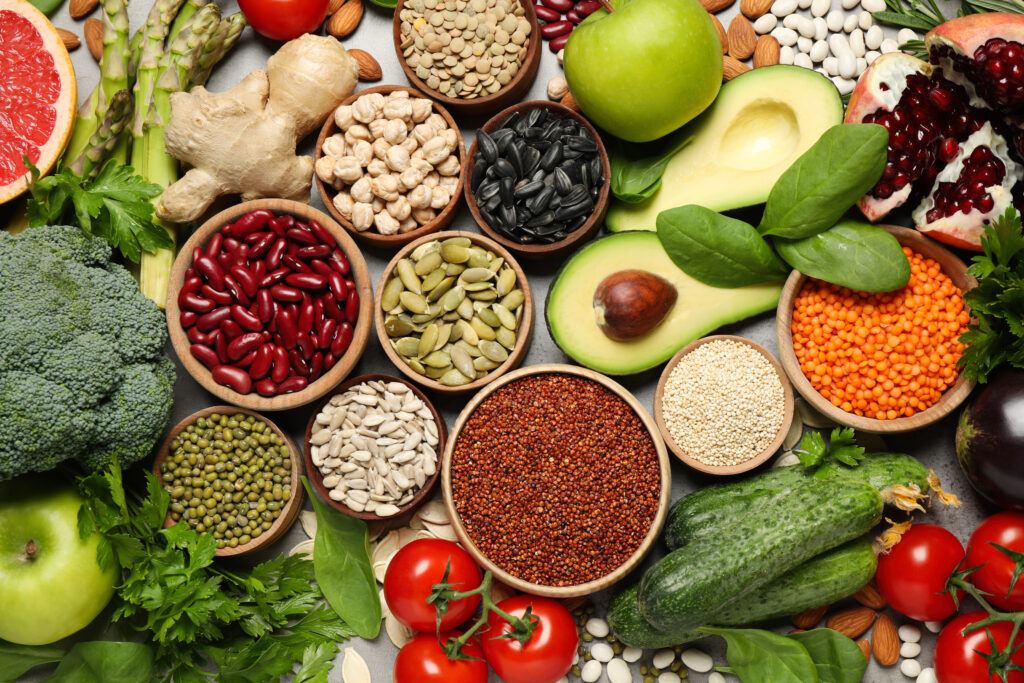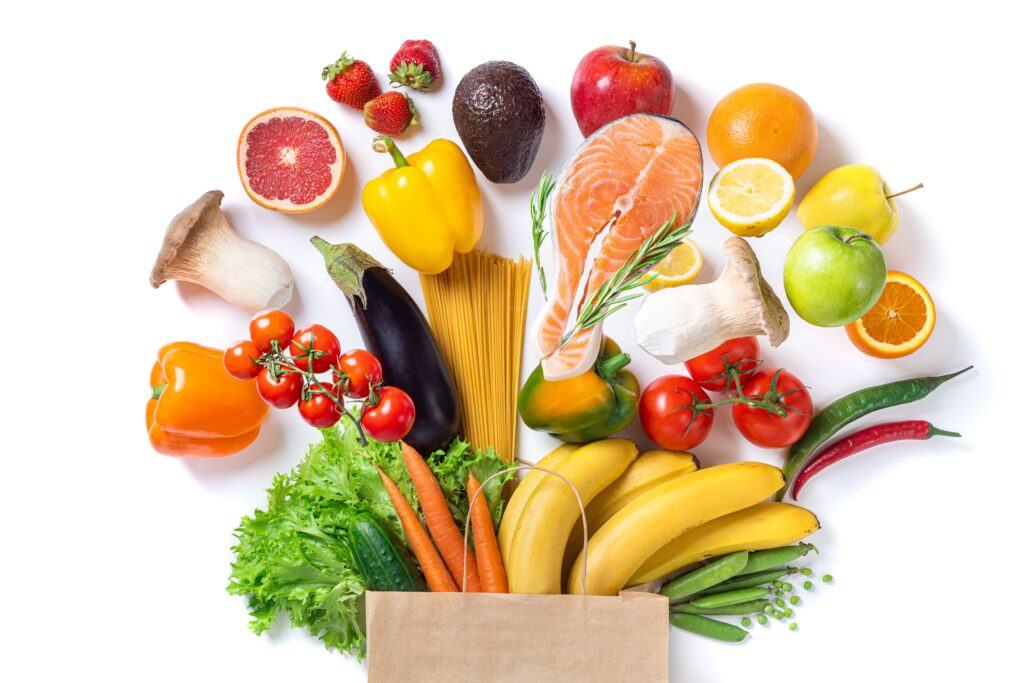Do you want to take the guess work out of providing a balanced meal for you and your family? Then this article is for you.

A balanced diet is the cornerstone of good health, providing the body with the essential nutrients it needs to function optimally. It is a diet that includes a variety of foods in the right proportions to maintain health, vitality, and overall well-being. This essay delves into the concept of a balanced diet, its components, and its significance. I have included a reference chart for daily nutritional requirements based on age and gender.
The Components of a Balanced Diet
Macro-nutrients: These include carbohydrates, proteins, and fats, which are the primary sources of energy for the body.
Micro-nutrients: Vitamins and minerals fall under this category and are crucial for various bodily functions.
Fibre: Fibre is essential for digestive health and is found in plants, in whole grains, fruits, nuts and vegetables. Most of the fibre in foods are found in the skin or outer layer of the fruit vegetable or grain. Leafy vegetables are also an important source of fibre.
Water: This liquid is vital for life. Water is necessary for hydration and to facilitate optimal bodily functions such as providing blood volume to support circulation of blood.
What is the Importance of Macro-nutrients?
Carbohydrates: Starches and sugars are the body’s main energy source. Good sources of carbohydrates are found in foods like rice, bananas, potatoes and oats.
Proteins: Are made up of amino acids and are needed for growth and repair of body tissues. Protein is present in nuts, fish, eggs, (and other animal source products)and legumes.
Fats: Is important for energy storage and cell function. Fats are available in seeds, nuts, vegetables like avocado, ackee, olives and in dairy products.

Vital Micro-nutrients: Minerals and Vitamins
Micro-nutrients: The Vital Elements such as vitamins and minerals support various processes in the body, such as bone health (calcium), blood health (iron), and immune function (vitamin C). Many minerals are only required in small trace amounts to support physical health, while others are needed in higher volumes.
“Minerals play an important role
in the production of enzymes that
help with digestion and metabolism“
Minerals play an important role in the production of enzymes that help with digestion and metabolism and catabolism in the body. All nutrients work together to support health and vitality. So it is important to have a wide variety of foods to have a balanced diet to build and repair a healthy body. For those who are challenged by nutritional deficiencies caused by various circumstances like fruits and vegetables sourced from over farmed land that are depleted in essential nutrients a good nutritional supplement may be the best decision. Here is my recommendation for you…
Chart of Daily Nutritional Needs for Adults
| Approximate Daily Nutrients requirement | Adult Man | Adult Woman |
| Calories | 2500 kcal | 2000 kcal |
| Protein | 55 g | 45 g |
| Fats | 97 g or 35% of food | 78 g or 35% of food |
| Carbohydrates | 333 g or 50% of food | 267 g or 50% of food |
| Fiber | 30 g | 30 g |
| Water | 2.5 litres | 2.25 litres water |
| Calcium | 700 mg/d | 700 mg/d |
| Magnesium | 300 mg | 270 mg/d |
| Iron | 8.7 mg/d | 14.8 mg/d |
| Salt /sodium | 5-6g | 5-6g |
| Potassium | 3500 mg/d | 3500 mg/d |
| Zinc | 9.5 mg/d | 7 mg/d |
| Selenium | 75 Mcg | 60 Mcg |
| Copper | 1.2 mg/d | 1.2 mg/d |
| Phosphorus | 700 mg/d | 700 mg/d |
| Iodine | 140 µg/d | 140 µg/d |
| Vitamin A | 700 µg/d | 600 µg/d |
| Vitamin B1 thiamine | 1 mg/d | 0.8 mg/d |
| Vitamin B2 riboflavin | 1.3 mg/d | 1.1 mg/d |
| Vitamin B3 niacin | 17 mg/d | 13.2 mg/d |
| Vitamin B6 pyridoxine | 1.4 mg/d | 1.2 mg/d |
| Vitamin B7 biotin | 30-100 µg/d | 30-100 µg/d |
| Vitamin B9 folate/ folic acid | 200 µg | 200 µg |
| Vitamin B12 cobalamin | 1.5 µg/d | 1.5 µg/d |
| Vitamin C | 40 mg/d | 40 mg/d |
| Vitamin D | 10 µg/d | 10 µg/d |
| Vitamin E | 15 µg/d | 15 µg/d |
| Vitamin K | 1µg /kg of weight | 1 µg/kg of weight |
Why a balanced diet is crucial for health

Preventing Nutritional Deficiencies: Ensuring your diet is rich in various nutrients help prevent deficiencies that can lead to health issues of weakened immunity and disease.
Maintaining a Healthy Weight: A balanced diet helps in weight management, which is important for overall health. It may be surprising to know that many people who are over weight are actually malnourished. Many lack the right amount of minerals and vitamins needed for making healthy blood cells and to repair tissue damage.
Reducing Disease Risk: A diet rich in fresh fruits, vegetables, and whole grains can lower the risk of chronic diseases such as high blood pressure chronic kidney disease and diabetes.
Achieving a Balanced Diet
To achieve a balanced diet, you need a Variety of foods to ensure a range of nutrients are consumed. Portion sizes of each meal is also important in ensuring a balanced diet. Eating in moderation and along breaks between meals is key to maintaining a healthy weight. Instead of snacking or grazing, meals must be spaced by a few hours to aid good digestion.

Limit Processed Foods: The method of food preparation can affect the nutritional quality of the finished product, even in home cooking. Overly refined foods that are pre-package often contain high levels of salt, sugar, and fat and are mostly void of fibre and vitamins and minerals.
In Conclusion
A healthy diet is not about strict limitations but about feeling great, having more energy, and improving your mood. By understanding the importance of food selection and preparation in taking a varied diet and incorporating nutrient-rich foods into daily meals, individuals and families can enjoy the benefits of good health and a vibrant life.
In summary, a balanced diet is a harmonious blend of macro-nutrients, micro-nutrients, adequate fibre, and water, tailored to an individual’s specific needs. It is a sustainable approach to eating, that supports the body’s requirements and promotes long-term health benefits. Not everyone may be able to have fresh fruits and vegetables everyday. But it is essential to have some raw fruits and vegetable daily to keep your body healthy.
If you are struggling to have all your essential nutrients everyday due to a busy life or demanding career you may do well to supplement your diet to prevent nutritional deficiencies that may or may not show signs and symptoms.

Thank you for the clarification on the misconception of healthy diet, is not about restricting yourself to certain types foods but having the right amount of nutrients in the body and feeling great and energised in the body.
Hi Esther,
thanks for reading my article and for your kind response. I am happy to know that you found it useful.
Best wishes,
Brenda